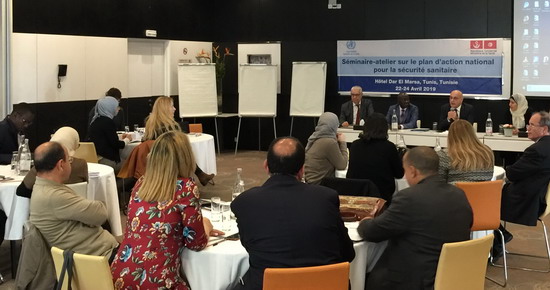
24 April 2019 – Between 22 and 24 April 2019, a workshop, organized by the WHO Regional Office and attended by representatives of public institutions in Tunisia, UNICEF and the World Organisation for Animal Health, was held to finalize the first draft of Tunisia’s national action plan to improve health security in line with the requirements of the International Health Regulations (IHR 2005). In December 2016, Tunisia completed its joint external evaluation (JEE) exercise, in which a country’s capacity to prevent, detect, and respond to public health threats is assessed. Tunisia identified priority areas for action to strengthen its national public health capacities to meet IHR requirements.
Dr Yves Souteyrand, WHO Representative in Tunis, highlighted the significant achievements that the Government had made in improving public health security within a multisectoral approach. “Tunisian counterparts have made significant progress since 2016 in implementing the recommendations of the JEE report, yet greater efforts are needed to achieve full implementation. WHO will continue working closely with the Government of Tunisia to support these efforts in ensuring Tunisian preparedness for any health emergency,” said Dr Souteyrand.
Participants were divided into groups based on their areas of expertise to discuss the 19 technical areas covered by the evaluation to develop or build on current core capacities and exchange information to develop the draft action plan and estimate costs for realization of the plan.
“Before the workshop, we held an important meeting with Dr Sonia Ben Cheikh, Her Excellency the Minister of Health, to present the recommendations of the JEE report, update the Minister on progress and elicit support for the way forward. The recommendations of the report provide an excellent opportunity for us to further focus on priority areas identified for improvement. Taking this opportunity, the Ministry of Health and all stakeholders will renew Tunisia’s commitment to achieve full implementation of the IHR,” said Dr Kaouther Harabech, national IHR focal point and Head of the Zoonotic Disease Unit in the Ministry of Health.
During the workshop, the WHO team thanked their Tunisian counterparts for honouring Dr Richard Valery Mouzoko Kiboung, a WHO epidemiologist, who was killed in an attack on 19 April 2019 while tirelessly devoting himself to Ebola response activities in North Kivu province, Democratic Republic of Congo.
Related links
Joint external evaluation of IHR core capacities, Tunisia
Strengthening health security by implementing the International Health Regulations





